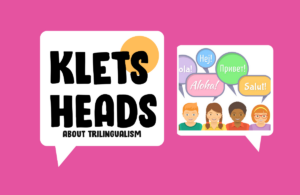Are you raising trilingual children? Do you worry that three languages are too many, and children might have trouble keeping the languages apart? ” Children are perfectly capable of learning three languages,” assures Dr Sharon Unsworth, a linguist at Radboud University, Nijmegen.
Many children worldwide don’t grow up with just one or even two languages, but with three and sometimes more. There are different ways in which children can become trilingual. They might live in a country where trilingualism is the norm, where everyone grows up with three languages. Think, for example, of countries such as India, Switzerland, Luxembourg, as well as many countries in Africa. Children might also become trilingual because they learn two new languages at school. For example, in the northern province of Friesland here in the Netherlands, children might speak Frisian at home and then learn Dutch and English at school. Children can also become trilingual because their parents each speak a different language to them and they learn a third language outside the home. For example, a Swedish-speaking father and a French-speaking mother raising their children in the Netherlands. There are actually far more trilingual children than you might first think, also in countries like the Netherlands.
If you are raising your children trilingually, you may worry that three languages are too many, and children may have trouble keeping the languages apart. This is not necessary. Children are perfectly capable of learning three languages. While they might not always start speaking in all three simultaneously, being exposed to three languages does not mean that children will inevitably start speaking later. Typically, just like bilingual children, children growing up with three or more languages reach the same developmental milestones for language, like babbling or producing their first word, around the same time as their monolingual peers, at least in one of their three languages.
How quickly trilingual children learn their three languages depends in part on how much contact they have with the languages in question. Language input is certainly important. But it is also good to realize that input isn’t everything. A recent study by Karolina Mieszkowska and her colleagues is relevant here. These researchers compared two groups of Polish-speaking 5-year-old children growing up in England: children who spoke Polish at home and English at school – they were bilingual – and children who spoke another language at home besides Polish – they were trilingual. Despite the fact that the trilingual children heard less Polish at home than the bilingual children, their scores on the Polish vocabulary tests were similar to each other, both when asked to recognize words and when asked to produce words themselves. The trilingual children did, however, score lower than their monolingual peers, that is, children growing up in Poland with Polish as their only language. When it came to the school language, English, the picture was different: there were no differences at all between the three groups in English. In other words, both the trilingual and the bilingual children scored as high as monolinguals. What this study suggests is that differences in the amount of input trilingual children hear may not affect their three languages in the same way.
It is unrealistic to expect that your trilingual child will be equally strong in all three languages. This is typically referred to as language dominance, and there are many factors that contribute to one language becoming dominant – for example, how much of a certain language the children hear, how much they get to use it, how proficient they are. Being dominant in one language is quite normal, although there are of course exceptions. How well a child can speak one language may change over time. Once a child goes to school, there is more emphasis on the school language and then it can be difficult to keep up the other language or languages. In this sense, it can be a good idea in the early years to focus on the language or languages that are not spoken at school. This will provide a solid basis for later. In most cases, children will learn the school language without too many problems, although there may be a need for additional support in the early stages.
Despite the fact that there are many trilingual children here in the Netherlands and beyond, research into their language development is still in its infancy. The research that is available suggests that there are some advantages to being trilingual. For example, being trilingual promotes your child’s metalinguistic awareness. That is, they are more aware of how languages work. Learning different languages opens up different perspectives on the world. For the child to know the parent’s minority language not only means that there will likely be a better parent-child relation, but it also promotes a deeper understanding of where that parent comes from. And of course, being trilingual means that you know three languages!

This article was written by Sharon Unsworth and Aniek Ebbinge. It is based on an episode of the Kletsheads podcast all about trilingualism. Kletsheads is a podcast about bilingual children for parents, teachers and speech-language therapists. In each episode, Dr. Sharon Unsworth, a linguist at Radboud University, Nijmegen, and mother of two children (both bilingual, of course), discusses the science behind the language development of bilingual children with another expert. There are practical tips, interviews with children about what it’s like growing up with two or more languages, and with parents and professionals about their experiences with bilingual children. Find out more at kletsheadspodcast.org or search for Kletsheads [English edition] in your favourite podcast app.
Wondering whether more than three languages is too many? Or what to do when you and your partner speak a third language with each other but not to your child? Find out more by listening to the podcast episode. And if you are raising a trilingual child and would like to participate in research, drop us a line at sharon.unsworth@ru.nl as we’re about to start a study on exactly this topic!
Source: Kletsheads
















